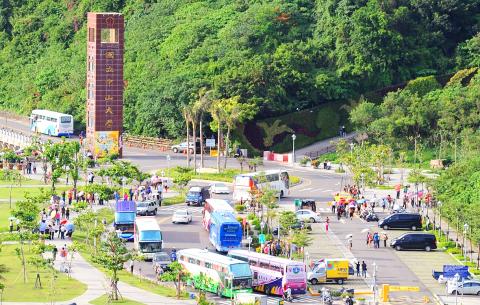Residents of the Hamasen area (哈瑪星) in Kaohsiung yesterday protested at a public hearing with city officials over Chinese tourists to the Sizihwan Scenic Area (西子灣), saying the surge of visitors has disrupted traffic, while business at local stores continues to suffer.
Chinese tourists are like “locusts,” because they arrive in swarms, Hamasen resident Lin King-li (林金利) said, adding that many litter, urinate and defecate on the streets.
He criticized the city government’s tourism policy, which focuses on boosting the number of Chinese visitors, saying that local businesses are not making any more profit from the increased tourism.

Photo: Chang Chung-i, Taipei Times
If the situation continues, Taiwan could become the next Hong Kong, he said.
Tourists do not necessarily bring revenue to a business, National Sun Yat-sen University educator Yu Chien-yuan (余建源) said.
He said the situation in Sizihwan is evidence that Chinese travel agencies that offer bargain packages do not boost tourism income, as the agencies take their clients dining and shopping only at stores they are affiliated with.
As a result, not only are people not receiving the revenues they were promised, the city has to use taxpayers’ money to clean up the mess caused by Chinese tourists, while Chinese businessesprofit.
Members from the Hamasen Vision Alliance and several other self-help groups said that Chinese visitors have degraded residents’ quality of life.
Meanwhile, the Kaohsiung City Government said that it would limit tour buses from 3pm to 7pm, starting on Sunday.
Bus access to the Sizihwan Scenic Area is to be capped at 15 vehicles every 20 minutes, it said.
Residents at the hearing called the move a “band-aid.”
Kaohsiung City Councilor Lee Chiao-ju (李喬如) said that Sizihwan is better without Chinese tourists if all they do is “pee and litter,” while Kaohsiung City Councilor Chien Huan-tsung (簡煥宗) called on the city’s Tourism Bureau to prepare a report on tourist-related problems.
He urged the city government to establish a committee of residents and academics to work out a long-term mitigation plan.

The Ministry of Economic Affairs has fined Taobao NT$1.2 million (US$36,912) for advertisements that exceed its approved business scope, requiring the Chinese e-commerce platform to make corrections in the first half of this year or its license may be revoked. Lawmakers have called for stricter enforcement of Chinese e-commerce platforms and measures to prevent China from laundering its goods through Taiwan in response to US President Donald Trump’s heavy tariffs on China. The Legislative Yuan’s Finance Committee met today to discuss policies to prevent China from dumping goods in Taiwan, inviting government agencies to report. Democratic Progressive Party Legislator Kuo Kuo-wen (郭國文) said

The Ministry of Economic Affairs has fined Taobao NT$1.2 million (US$36,900) for advertisements that exceeded its approved business scope and ordered the Chinese e-commerce platform to make corrections in the first half of this year or its license would be revoked. Lawmakers have called for stricter supervision of Chinese e-commerce platforms and more stringent measures to prevent China from laundering its goods through Taiwan as US President Donald Trump’s administration cracks down on origin laundering. The legislature’s Finance Committee yesterday met to discuss policies to prevent China from dumping goods in Taiwan, inviting government agencies to report on the matter. Democratic Progressive Party

Taiwan and its Pacific ally Tuvalu on Tuesday signed two accords aimed at facilitating bilateral cooperation on labor affairs, according to Taiwan’s Ministry of Foreign Affairs (MOFA). The governments inked two agreements in Taipei, witnessed by Foreign Minister Lin Chia-lung (林佳龍) and visiting Deputy Tuvaluan Prime Minister Panapasi Nelesone, MOFA said in a news release. According to MOFA, the agreements will facilitate cooperation on labor issues and allow the two sides to mutually recognize seafarers’ certificates and related training. Taiwan would also continue to collaborate with Tuvalu across various fields to promote economic prosperity as well as the well-being of their

Sung Chien-liang (宋建樑), who led efforts to recall Democratic Progressive Party (DPP) Legislator Lee Kun-cheng (李坤城), was released on bail of NT$80,000 today amid outcry over his decision to wear a Nazi armband to questioning the night before. Sung arrived at the New Taipei District Prosecutors’ Office for questioning in a recall petition forgery case last night wearing a red armband bearing a swastika, carrying a copy of Adolf Hitler’s Mein Kampf and giving a Nazi salute. Sung left the building at 1:15am without the armband and covering the book with his coat. Lee said today that this is a serious